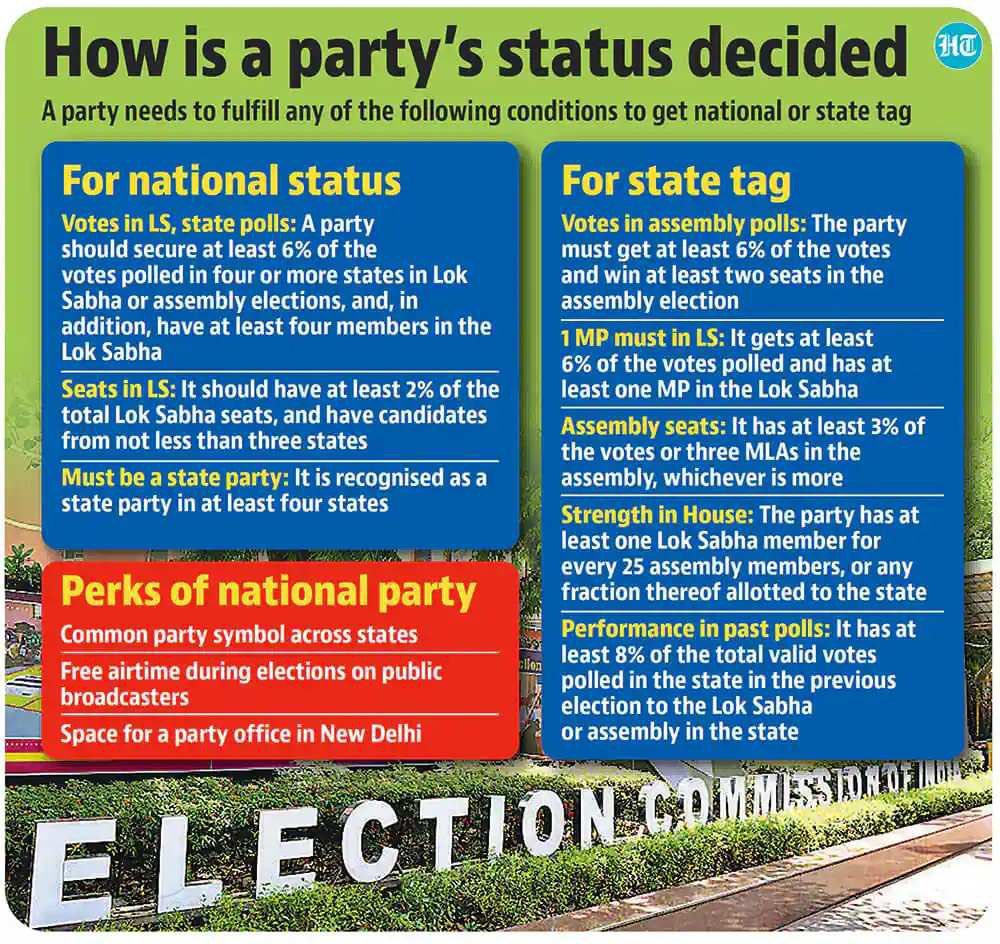Context
-
With no elected MP in Lok Sabha and its vote share this general election down to 2.04%, the Bahujan Samaj Party (BSP), the only national-level Dalit party in the country, could lose its national status once the Election Commission carries out its customary review post general elections.
Background
- Founded in April 1984 by Kanshi Ram who later named Mayawati as his successor, BSP was recognised as a national party in 1997.
- Currently, there are six political parties recognised as national parties by the poll watchdog – BJP, BSP, Congress, AAP, National People’s Party, and CPM.

Back to Basics
Recognition of national party tag
- According to the Election Symbols (Reservation and Allotment) Order, 1968, a national party is one that has
- at least 6% of the total valid votes in four or more states in the last general election and at least four MPs;
- or wins at least 2% of the seats in the Lok Sabha, with the winners being from at least three states;
- or is a recognised state party in at least four states.
- As per the Symbols Order,
- a state party is one which has got at least 6% of the total valid votes in a state and at least two MLAs;
- or at least 6% of the total valid votes polled in the state in the last Lok Sabha elections and at least one MP from that state;
- or at least 3% of the total seats in the Assembly or three seats, whichever is higher;
- or at least one MP for every 25 seats allotted to that state in the Lok Sabha;
- or at least 8% of the total valid votes in the last Lok Sabha election in that particular state or Assembly election.
- Post the 2014 elections, the Symbols Order was amended in 2016 with effect from January 1, 2014 saying that a party’s national or state recognition would not be reviewed in the first election after the one in which they gain the status, meaning the first review would be after 10 years. This benefit was given to all parties, even the BSP, which became a national party in 1997.
What are the advantages of being a national party in India?
- If a party is granted national status, it has specific benefits and advantages, such as reserved party symbols, and its candidates get more coverage on television and radio during elections.
- The right to use a reserved symbol is granted to a national party for all elections held throughout the country. This emblem is unique to the party and may not be used by anyone else.
- A national party can run in elections across the country and field candidates in any state, allowing it to broaden its support and influence.
- A national party can engage 40 star campaigners, compared with 20 for a registered unrecognised party. The expenses of star campaigners are not included in the party’s overall costs of organising an election campaign.
- A party having ‘national’ status receives land from the government to build its headquarters.
- National parties must have only one proposer in order to submit a nomination. During the roll revision, they are provided with two free sets of electoral rolls. They also get one free electoral roll for each candidate during general elections.
State Party vs National Party
- If a party is recognised as a State Party’, it is entitled for exclusive allotment of its reserved symbol to the candidates set up by it in the State in which it is so recognised, and if a party is recognised as a `National Party’ it is entitled for exclusive allotment of its reserved symbol to the candidates set up by it throughout India.
- Recognised `State’ and `National’ parties need only one proposer for filing the nomination and are also entitled for two sets of electoral rolls free of cost at the time of revision of rolls and their candidates get one copy of electoral roll free of cost during General Elections.
- Further they get broadcast/telecast facilities over Akashvani/Doordarshan during general elections.
- Political parties are entitled to nominate “Star Campaigners” during General Elections.
- A recognized National or State party can have a maximum of 40 “Star campaigners” and a registered un-recognised party can nominate a maximum of 20 ‘Star Campaigners”.
- The travel expenses of star campaigners are not to be accounted for in the election expense accounts of candidates of their party.
Source: IE & Business Standard
Visit Abhiyan PEDIA (One of the Most Followed / Recommended) for UPSC Revisions: Click Here
IAS Abhiyan is now on Telegram: Click on the Below link to Join our Channels to stay Updated
IAS Abhiyan Official: Click Here to Join
For UPSC Mains Value Edition (Facts, Quotes, Best Practices, Case Studies): Click Here to Join
